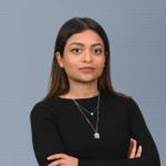
(Left) UNHCR spokesperson Firas al-Khateeb. Photo: Rudaw (Right) Protestors outside UN building on May 20, 2021. Photo: Bilind T. Abdullah
ERBIL, Kurdistan Region — The UN refugee agency (UNHCR) said on Friday there are more than 10,700 refugees from Iran registered with the organization in Iraq, with the vast majority in the Kurdistan Region.
Firas al-Khateeb, a spokesperson for the agency, told Rudaw in a television interview that the UNHCR’s main mission is to protect refugees.
“There are many asylum seekers from Iran who have been in the Kurdistan Region for decades and they do enjoy their rights,” Khateeb said.
Dozens of Kurdish refugees from Iran gathered in front of the United Nations office in Erbil on Thursday to demand further rights, days after a Kurdish refugee from Iran self-immolated in front of the office over his living conditions.
Protestor Rasul Rahim Pirot, told Rudaw he had been in the Kurdistan Region for years and received only 480,000 IQD from the UN once, adding he was unemployed. Pirot said Kurds from Iran had lived in the Kurdistan Region for years and “haven’t received help here.”
Khateeb said the financial aid the UNHCR grants to refugees is not sufficient for everyone, and is distributed according to priority.
He stated the deputy director of the UN commission met with representatives from Thursday’s protest and heard their demands.
Some Iranian refugees were able to obtain resettlement in a third country but the number has decreased over the past two years due to the coronavirus pandemic, according to Khateeb.
“The UNHCR is keen to prevent the refugee from returning to his/her country forcibly, and there are lawyers who represent refugees in the event that they are exposed to legal problems,” Khateeb said, adding that the agency “does not provide protection to anyone who was armed or has a criminal history, so we are keen to check refugee records."
The spokesperson noted that there are 80 million displaced people around the world, including 255,000 Syrian refugees and 50,000 non-Syrian refugees in the Kurdistan Region alone.








Comments
Rudaw moderates all comments submitted on our website. We welcome comments which are relevant to the article and encourage further discussion about the issues that matter to you. We also welcome constructive criticism about Rudaw.
To be approved for publication, however, your comments must meet our community guidelines.
We will not tolerate the following: profanity, threats, personal attacks, vulgarity, abuse (such as sexism, racism, homophobia or xenophobia), or commercial or personal promotion.
Comments that do not meet our guidelines will be rejected. Comments are not edited – they are either approved or rejected.
Post a comment